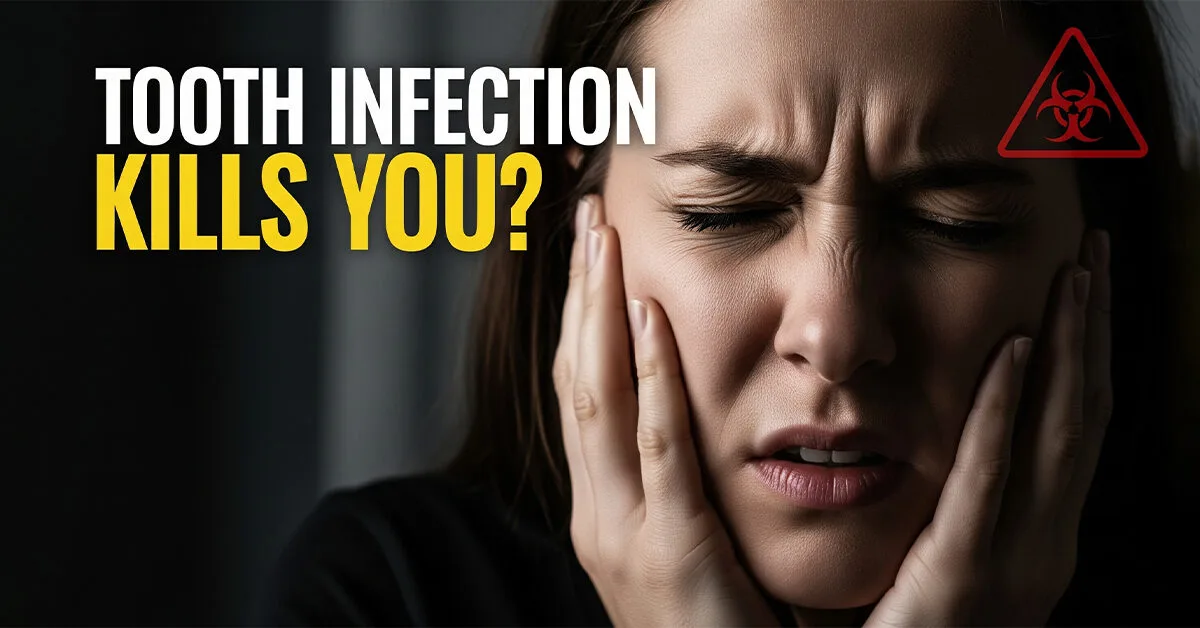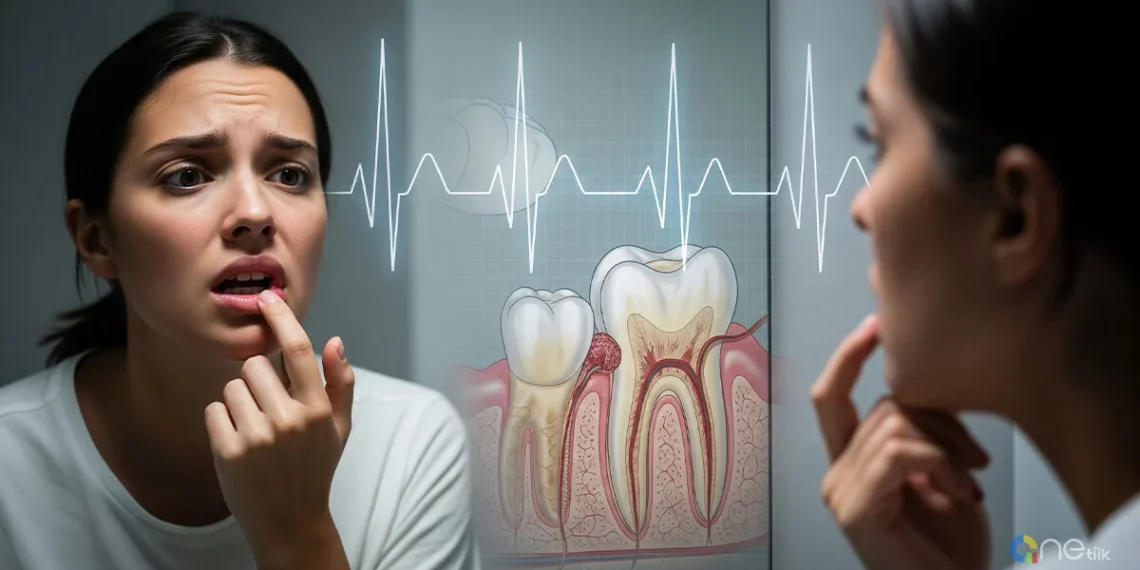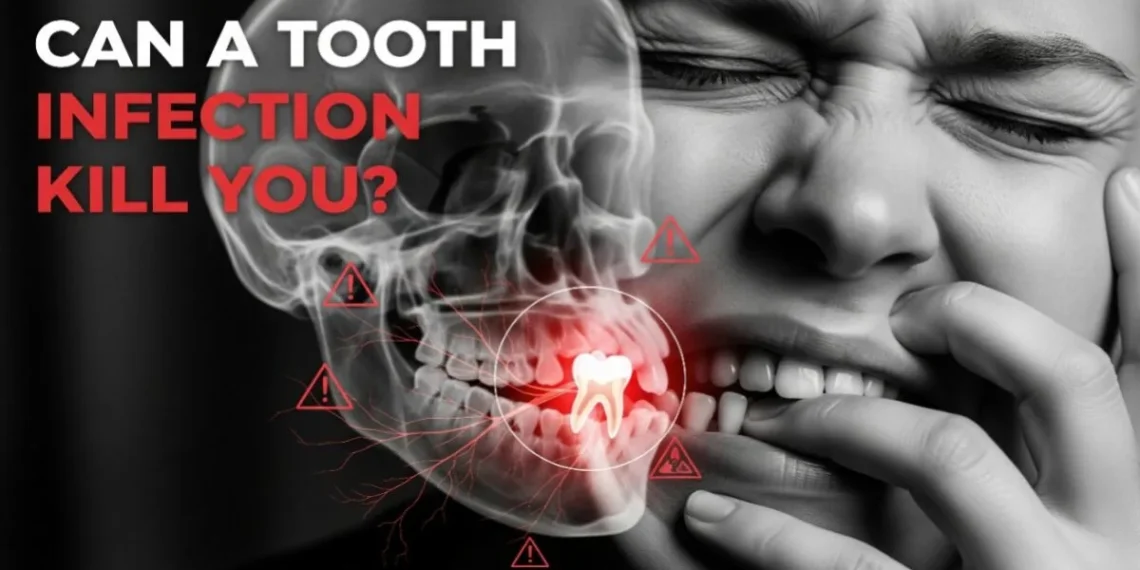The Hidden Dangers of Untreated Tooth Infections
Most people dismiss toothaches as a minor issue, something that can be managed with painkillers until a dentist appointment fits into their schedule. But what many don’t realize is that an untreated tooth infection can turn deadly in a matter of days or weeks.
A dental abscess, caused by bacteria entering the tooth’s inner pulp, is more than just painful. Left unchecked, the infection can spread into the bloodstream, damaging vital organs such as the heart, brain, or lungs. In the worst cases, this can lead to sepsis, organ failure, or even death from a dental abscess.
So, how long until a tooth infection kills you? The answer depends on the individual, but medical evidence shows that complications can develop shockingly fast. This article explains how tooth infections form, how quickly they become life-threatening, the warning signs you should never ignore, and, most importantly, how to prevent them.
What Exactly Is a Tooth Infection and Why Does It Happen?
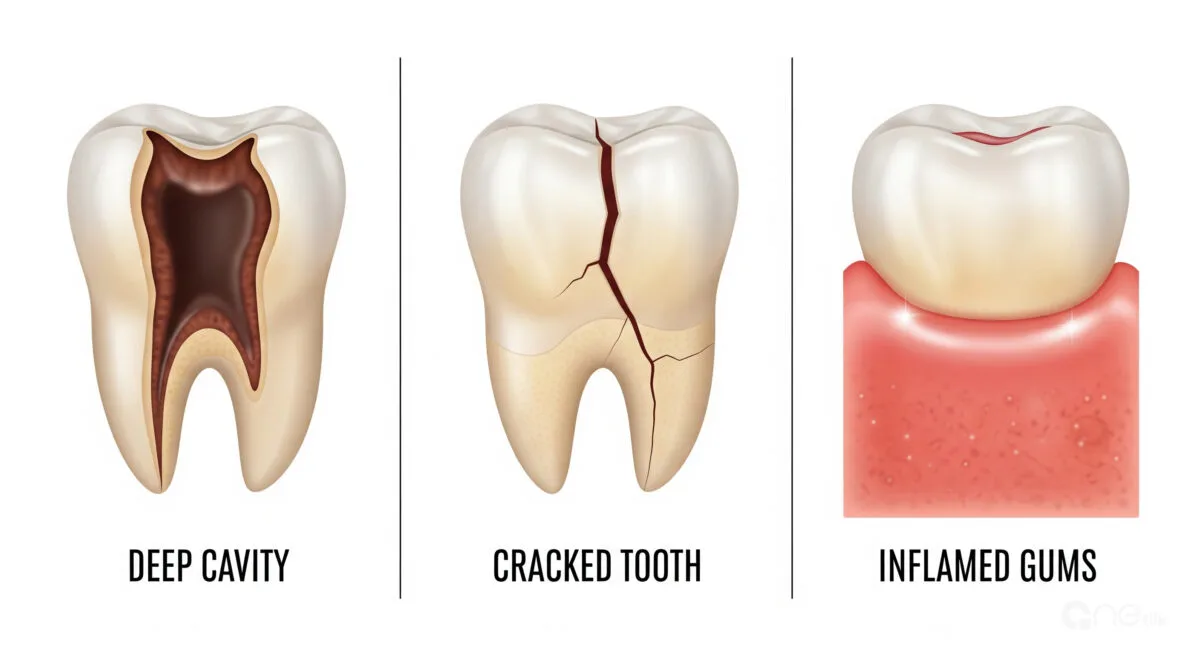
A tooth infection, or dental abscess, happens when bacteria invade the pulp of the tooth. Once inside, bacteria multiply, pus builds up, and pressure causes throbbing pain. Without treatment, the infection spreads.
Common Causes Behind Dental Abscesses
- Untreated tooth decay: Deep cavities allow bacteria to reach the pulp, sometimes leading to death if ignored.
- Cracked or broken teeth: Even tiny cracks can let bacteria inside. Many wonder, can a broken tooth make you sick? The answer is yes, it can lead to dangerous infections.
- Gum disease (periodontitis): Infections in gum pockets can trigger abscesses.
- Wisdom teeth problems: Impacted or infected wisdom teeth are notorious. Cases of infected wisdom tooth death have been reported, proving the risk is real.
Different Types of Tooth Infections You Should Know
- Periapical abscess – at the root tip, often from untreated cavities.
- Periodontal abscess – begins in the gums and spreads into the bone.
- Pericoronal abscess – common around wisdom teeth.
How Quickly Can a Tooth Infection Become Life-Threatening?
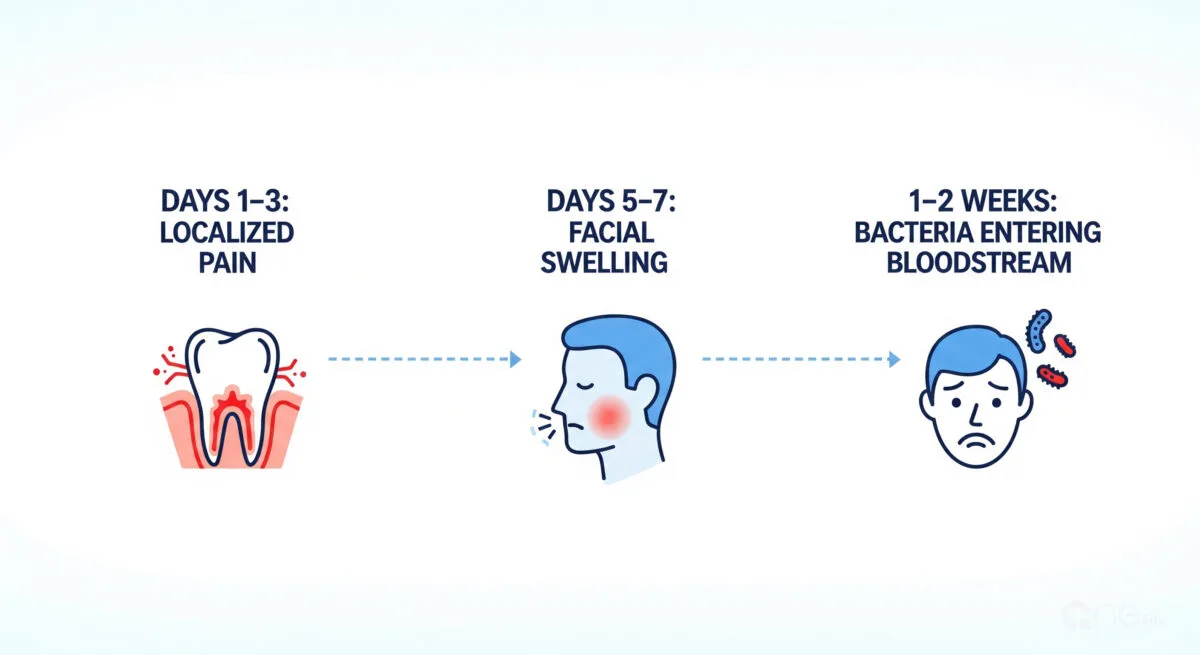
This is the question patients often fear most: How long until a tooth infection kills you?
- Days 1–3: Localized pain, swelling, and pus formation.
- By 5–7 days: Infection can spread to nearby tissues, causing facial swelling and fever.
- Within 1–2 weeks: If ignored, bacteria may enter the bloodstream, leading to sepsis or even death.
That means tooth abscess death can occur in as little as a week, especially in people with weak immune systems.
Life-Threatening Complications of Untreated Tooth Infections
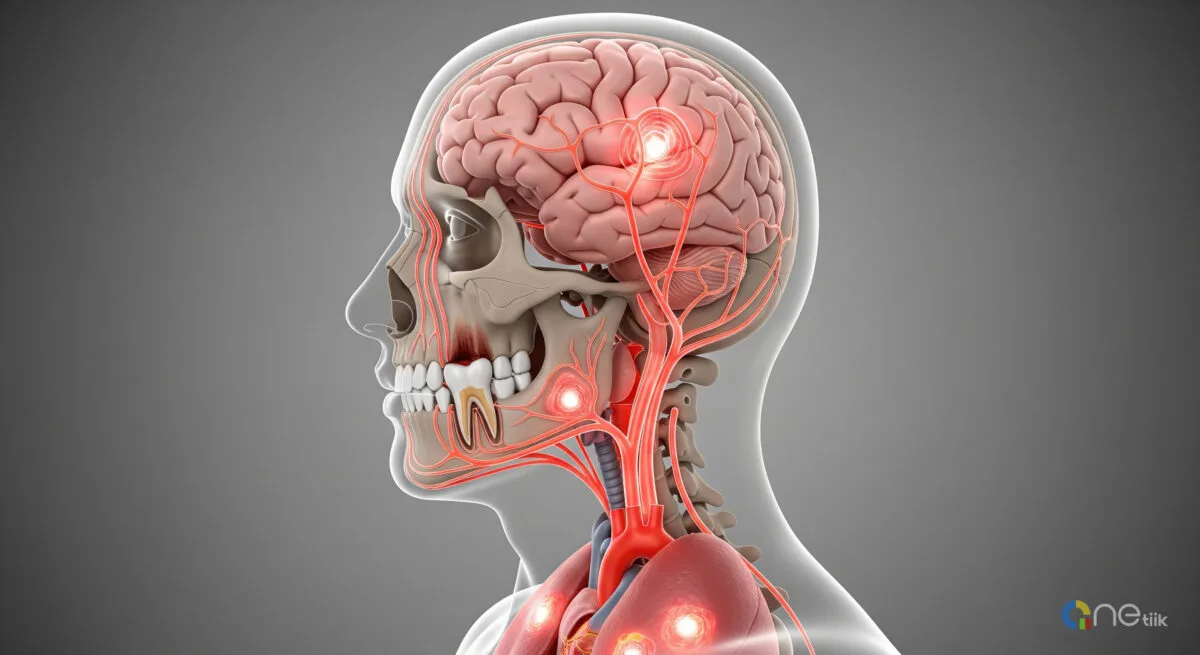
Ignoring a dental abscess isn’t just about dealing with pain; it’s about avoiding serious medical emergencies.
Sepsis: When a Tooth Infection Spreads to the Blood
When bacteria reach the bloodstream, they can trigger sepsis, a dangerous immune response that shuts down organs.
Signs include: high fever, confusion, rapid heart rate, and chills.
Brain, Heart, and Lung Risks Linked to Dental Abscesses
- Brain abscess or meningitis: Infections spreading from teeth to the brain can be fatal.
- Endocarditis: Bacteria from abscesses may inflame heart valves.
- Lung infections: Aspiration of pus may cause pneumonia.
Local Damage That Can Escalate Into a Medical Emergency
Even before spreading, tooth infections can cause dangerous local issues:
- Cellulitis in the face or neck, sometimes blocking airways.
- Osteomyelitis (jawbone infection).
- Rotting teeth leading to systemic illness.
Can Gum Infections Be Just as Dangerous?
Yes. Gum infections, such as periodontitis, can spread just like tooth infections. Severe gum disease may even raise risks of heart disease, stroke, and respiratory infections.
Warning Signs Your Tooth Infection May Be Turning Fatal

Seek urgent care if you notice:
- Severe throbbing pain spreading to the ear, jaw, or head.
- Swelling in the face, neck, or jaw.
- Difficulty breathing or swallowing.
- High fever and chills.
- A foul taste or pus discharge.
These are all red flags of a tooth infection, death risk if ignored.
Emergency Treatments That Can Save Your Life
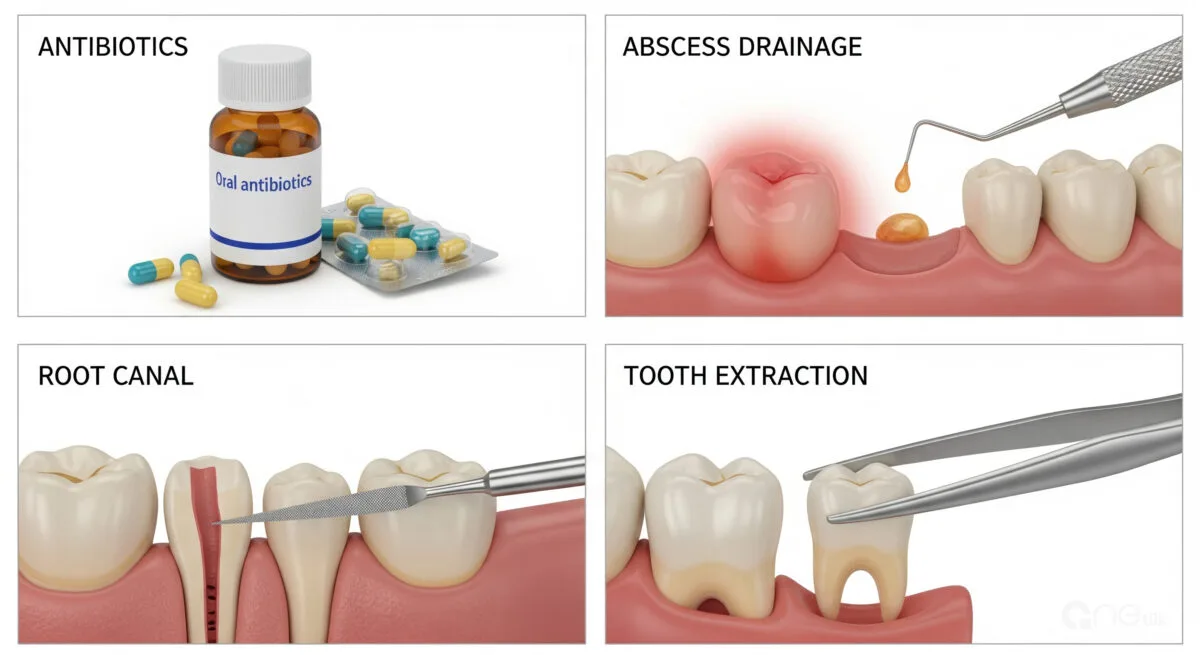
When caught early, treatment is simple. But if the infection spreads, aggressive care is needed. Options include:
- Antibiotics are used to stop bacterial growth.
- Abscess drainage to remove pus.
- Root canal treatment to save the tooth.
- Tooth extraction if the damage is beyond repair.
- Hospitalization for sepsis, including IV antibiotics.
Recovery After Treatment: Eating Right for Faster Healing
Healing from abscess drainage, root canal, or extraction requires a soft, nutrient-rich diet. Avoid hard, crunchy foods that irritate the wound.
For detailed recovery-friendly meal options, check our guide: 50 Best Soft Foods to Eat After Tooth Extraction.
Building Immunity to Fight Dental Infections Naturally
A strong immune system helps your body fight off infections before they spread. Boost immunity by:
- Eating vitamin-rich foods.
- Staying active.
- Managing stress.
- Sleeping well.
For a deeper dive into natural immunity, see our Ultimate Guide to Immuno Boost.
Smart Prevention: How to Stop Tooth Infections Before They Start
The best way to avoid tooth infection is through prevention.
- Daily oral care: Brush twice daily, floss, and rinse with antibacterial mouthwash.
- Regular dentist visits: Early treatment prevents abscess formation.
- Lifestyle habits: Limit sugar, avoid smoking, and eat a balanced diet.
Final Takeaway: Don’t Ignore the Warning Signs
So, how long until a tooth infection kills you? In some cases, as little as 7–14 days. That’s how quickly bacteria can spread from your mouth into vital organs.
The key lesson is simple: don’t ignore tooth pain. With timely care, proper oral hygiene, and preventive habits, you can avoid the severe risks of sepsis or death from dental abscesses.
Your smile is important, but your life is priceless—never wait when it comes to infections.
Frequently Asked Questions (FAQs) About Tooth Infections
How long can you live with a tooth infection?
Without treatment, a tooth infection can become life-threatening in as little as 7–14 days. The timeline depends on your overall health and immune system. That’s why it’s critical to see a dentist immediately if you notice swelling, pus, or severe pain.
Can a tooth infection kill you?
Yes. Although rare, tooth abscess death is medically documented. When bacteria spread from the infected tooth to the bloodstream or organs, it can lead to sepsis, brain infection, or heart complications that may be fatal.
Can a broken tooth make you sick?
Absolutely. A cracked or broken tooth provides bacteria a direct path into the pulp. This can result in an abscess, and if ignored, may cause systemic illness. In severe cases, it can even lead to death from a tooth infection.
How do you know if a tooth infection is spreading?
Warning signs include facial swelling, fever, difficulty breathing or swallowing, and severe pain spreading to the jaw or ear. These are signs that the infection has moved beyond the tooth and requires urgent medical care.
Can you die from a wisdom tooth infection?
Yes. Impacted or infected wisdom teeth can cause abscesses that spread rapidly. While not common, there have been reported cases of infected wisdom tooth death when treatment was delayed.
Can bad teeth kill you slowly?
Yes. Long-term untreated cavities, gum disease, or rotting teeth can weaken the body, increase risks of chronic illness, and eventually contribute to life-threatening infections.
How can you prevent tooth infection death?
The best prevention steps include: Brushing and flossing daily, visiting the dentist twice a year, treating cavities early, and maintaining a healthy immune system.

